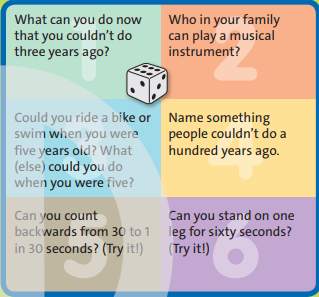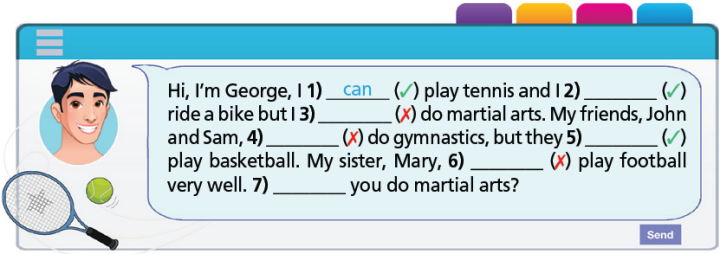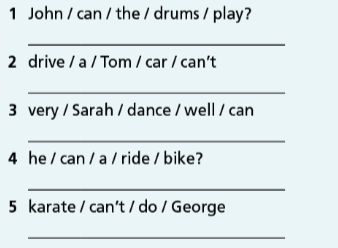2. Change the sentences into the affirmative (✔), negative (X) or question (?) form.
(Biến đổi các câu sang thể khẳng định, phủ định, hoặc nghi vấn.)
Inventors can't make a lot of different things. ✔
(Các nhà phát minh không thể tạo ra nhiều thứ khác nhau.)
Inventor can make a lot of different things.
(Nhà phát minh có thể làm rất nhiều thứ khác nhau.)
1 Albert can speak five languages. ?
2 I could read when I was three years old. X
3 Tim and Steve can’t cook well. ✔
4 My dad couldn’t swim very fast last year. ✔
5 We can understand Italian. X
6 Kim could read when she was five. ?
Can và could đều được dịch ra nghĩa tiếng Việt là ‘có thể’. Cả 2 động từ khuyết thiếu này đều dùng để chỉ khả năng xảy ra sự việc (possibility) và thể hiện sự xin phép (permission), yêu cầu hoặc đề nghị ai đó làm gì (request).
Cấu trúc:
Khẳng định: S + can/could + V nguyên thể
Phủ định: S + can/could + not + V nguyên thể
Nghi vấn: Can/Could + S + V nguyên thể
Yes, S + can/could
No, S + can/could not
Với chức năng dự đoán khả năng xảy ra sự việc, can dùng để miêu tả sự thật hiển nhiên, tất yếu, với độ tin tưởng và chắc chắn cao. Khi dùng could chỉ là dự đoán tin tưởng bởi người nói, không chắc chắn về sự vật.
Khi hỏi xin phép làm gì đó, nếu dùng could thì mức độ trang trọng sẽ cao hơn can. Còn khi muốn yêu cầu ai đó làm gì, bạn đều có thể dùng can hoặc could, nhưng could thường được sử dụng nhiều hơn trong trường hợp này bởi sắc thái nghĩa lịch sử hơn so với can.
1 Nói về khả năng làm được một việc gì đó của chủ ngữ: dùng CAN cho ngữ cảnh ở hiện tại, COULD cho ngữ cảnh ở quá khứ.
2 Nói về khả năng xảy ra của một việc: chỉ dùng COULD, không dùng CAN. Theo cách dùng này, could chính là mang ý nghĩa phỏng đoán một sự việc có khả năng xảy ra trong tương lai – cách dùng mà can không có.
3 Nói về khả năng mà hoàn cảnh cho phép: dùng CAN nếu bạn khá chắc chắn rằng sẽ có, dùng COULD nếu không chắc chắn lắm, không chắc chắn bằng.
4 Yêu cầu, nhờ vả ai đó làm việc gì một cách lịch sự: dùng CAN YOU hoặc COULD YOU đều được (cách dùng COULD YOU lịch sự hơn một chút, nhưng cơ bản thì cũng như CAN YOU)
5 Xin phép ai đó cho mình làm việc gì có liên quan đến họ: dùng CAN I hoặc COULD I. Can và could trong câu hỏi xin phép đều mang ý nghĩa sắc thái hỏi lịch sự nhưng could có phần nghiêm trang hơn một chút.
1 Albert can speak five languages. ?
(Albert có thể nói năm thứ tiếng.)
Can Albert speak five languages?
(Albert có thể nói năm thứ tiếng không?)
2 I could read when I was three years old. X
(Tôi biết đọc khi tôi ba tuổi.)
I couldn’t read when I was three years old.
(Tôi không biết đọc khi mới ba tuổi.)
3 Tim and Steve can’t cook well. ✔
(Tim và Steve không thể nấu ăn ngon.)
Tim and Steve can cook well.
(Tim và Steve có thể nấu ăn ngon.)
4 My dad couldn’t swim very fast last year. ✔
(Năm ngoái, bố tôi không thể bơi nhanh lắm.)
My dad could swim very fast last years.
(Năm ngoái bố tôi có thể bơi rất nhanh.)
5 We can understand Italian. X
(Chúng tôi có thể hiểu tiếng Ý.)
We can’t understand Italian.
(Chúng tôi không thể hiểu tiếng Ý.)
6 Kim could read when she was five. ?
(Kim có thể đọc khi cô ấy 5 tuổi.)
Could Kim read when she was five?
(Kim có thể đọc khi cô ấy 5 tuổi không?)

Các bài tập cùng chuyên đề
1.Change the words in bold from affirmative to negative, or negative to affirmative, to make sentences.
(Chuyển các từ in đậm từ khẳng định sang phủ định hoặc phủ định thành khẳng định để đặt câu.)
1 Most children can read until they’re six.
(Hầu hết trẻ em có thể đọc cho đến khi lên sáu tuổi.)
2 Mozart couldn’t compose music when he was five.
(Mozart không thể sáng tác nhạc khi mới 5 tuổi.)
2.Look at the sentences in exercise 1 again and choose the correct words in the Rules.
(Nhìn lại các câu trong bài tập 1 và chọn từ đúng trong Quy tắc.)
|
RULES |
|
1 We use can to talk about the present / past and could to talk about the present / past. 2 We use a base form with / without to after can and could. 3 The he / she / it form of can is can / cans. 4 The negative forms are don’t can and didn’t can / can’t and couldn’t. 5 We use / don’t use do and did to make questions with can and could. For example: At what age can most people talk? When could you first speak English? |
3.Complete the text with affirmative and negative forms of can and could.
(Hoàn thành văn bản với các dạng khẳng định và phủ định của can và could.)
William Sidis
Supergenius
Most people can’t read until they’re six and they (1) …………. usually speak one, two or maybe three
languages as children. William Sidis was born in 1898, and when he was eighteen months old, he (2)
…………. read. Before he was eight he wrote four books and (3) …………. speak eight languages. William was
a genius with a very high IQ, but in the end he lived a lonely life. He went to university at eleven, but he (4)
…………. make friends and was very unhappy. William died in 1944. Prodigies (5) …………. do special or
amazing things, but they (6) …………. always find a place in society. Life is sometimes dificult when you’re
different.
Finished? Write sentences about things you couldn’t do in the past, but that you can do now.
(Bạn đã hoàn thành? Viết câu về những điều bạn không thể làm trong quá khứ, nhưng bạn có thể làm bây giờ.)
4.TALK ABOUT … Work in groups of four. You need a dice. Take turns rolling the die and answering the question with the same number. If you get the same number twice, roll again.
(NÓI VỀ ... Làm việc theo nhóm bốn người. Bạn cần một con xúc xắc. Lần lượt thả con súc sắc và trả lời câu hỏi cùng số. Nếu bạn nhận được cùng một số hai lần, hãy thả lại.)

5.Complete the sentences using can, can’t, couldor couldn’t.
(Hoàn thành các câu bằng cách sử dụng can, can’t, could hoặc couldn’t.)
1 ……….. that child prodigy play the piano when she was two?
2 The boy on TV now ……….. remember 1,000 different numbers – he’s amazing!
3 My little sister ……….. write any words at the moment, but she can read easy sentences.
4 We ……….. play tennis when we were ten, but we’re good at it now.
5 That famous artist ……….. paint well at an early age.
6 How many languages ……….. your cousin speak now?
can (có thể)
7. Fill in each gap with can or can't.
(Điền vào mỗi chỗ trống với can hoặc can’t.)

8. Tell your partner about what you can do and what you can't do.
(Nói với bạn cùng cặp của bạn về những gì bạn có thể làm hoặc những gì bạn không thể làm.)
3. Complete the sentences with can or can’t.
(Hoàn thiện các câu sau với có thể hoặc không thể.)
|
Grammar (Ngữ pháp) |
Can/can’t for ability (can/ can't chỉ khả năng) |
|
+ |
- |
|
I can cook. (Tôi có thể nấu ăn.) She can draw. (Cô ấy có thể vẽ.) |
I can’t sing. (Tôi không thể hát.) She can’t drive. (Cô ấy không thể lái xe.) |
|
? |
|
|
Can you sing? (Bạn có thể hát không?) Can he speak English? (Anh ấy có thể nói Tiếng Anh không?) |
Yes, I can. / No, I can’t. (Có, tôi có thể. /Không, tôi không thể.) Yes, he can. / No, he can’t. (Có, anh ấy có thể. / Không, anh ấy không thể.) |
1. We can speak French, but we can’t speak German.
(Chúng tôi có thể nói Tiếng Pháp, nhưng chúng tôi không thể nói Tiếng Đức.)
2. I’m afraid of water, so I ____ swim.
3. My brother can’t play the guitar, but he ____ play the piano.
4. My parents ____ drive, so I take a bus to school.
5. I ____ help you – I ____speak Italian. Sorry!
6. What a terrible group! The singer ____ sing!
5. In pairs, ask and answer the questions.
(Làm việc theo cặp, hỏi và trả lời những câu hỏi.)
Can you... (Bạn có thể...)
1. sleep in a chair? (ngủ trên ghế?)
2. run more than two kilometres? (chạy nhiều hơn 2km?)
3. do your homework on a bus / in bed? (làm bài tập về nhà trên xe buýt / trên giường?)
4. draw people’s faces? (vẽ tranh chân dung?)
5. shoot a basketball? (ném bóng rổ?)
6. bake a cake? (nướng một chiếc bánh?)
7. say “Hello” in French or German? (nói “xin chào” bằng tiếng Pháp hay tiếng Đức?)
8. read music notes? (đọc các nốt nhạc?)
A: Can you …?
B: Yes, I can. / No, I can’t.
can
6. Look at the table and complete the sentences.
(Nhìn vào bảng trên và hoàn thành câu.)

1. Samantha and Alice can cook.
(Samantha và Alice có thể nấu ăn.)
2. _______ Peter draw? - No, he _____.
3. Samantha ______ use a computer, but she ______ cycle.
4. They all _____ use a computer.
5. _____ Peter and Alice play the piano? - Yes, they _____.
2. Use the pictures and the verbs below to complete sentences 1-6.
(Dùng những hình ảnh và những động từ ở bên dưới để hoàn thành câu từ 1-6.)

1. Minh can shoot a basketball.
(Minh có thể ném quả bóng rổ vào lưới.)
2. Quang ____.
3. Hoa ____.
4. Bình ____.
5. Nga ____.
6. Bích ____.
3. Write questions and short answers for the sentences in Exercise 2.
(Viết câu hỏi và câu trả lời ngắn cho những câu ở bài tập 2.)
1. A: Can Minh shoot a basketball?
(Minh có thể bắt bóng rổ được không?)
B: Yes, he can.
(Vâng, anh ấy có thể.)
2. ____.
3. ____.
4. ____.
5. ____.
6. ____.
1. Complete the table with the words.
(Hoàn thành bảng với các từ bên dưới.)

|
Present |
|
|
Affirmative I can bake a cake. |
Negative She 1 sing. |
|
Questions 2 they sing? |
Short answers Yes, they 3 No, they 4 |
|
Past |
|
|
Affirmative He 5 dance. |
Negative We couldn’t 6 tennis. |
|
Questions 7 you speak German? |
Short answers Yes, I 8 No, I 9 |
3. Write questions with can or could. Then write short answers that are true for you.
(Viết các câu hỏi với can hoặc could. Sau đó viết các câu trả lời đúng với bạn.)
Could you ride (you / ride) a bike when you were six?
(Bạn có thể lái một chiếc xe đạp khi bạn sáu tuổi không?)
Yes, I could
(Vâng, tôi có thể)
1 (you /make) music videos?
2 (you /swim) when you were nine?
3 (you /play) chess when you were eight?
4. Write sentences with can /can’t, could /couldn’t and some of the words in the table.
(Viết câu với can / can’t, could / can’t và các từ trong bảng sau.)
|
People |
|
I My mum/dad My grandmother/grandfather My favourite film / sports star |
|
Verbs |
|
cook draw drive paint play speak |
|
Other words |
|
a car football Spanish the guitar nice pictures Italian food |
|
Time experessions |
|
now last year in2015 when I/he/she was young at the age of |
I couldn’t play the guitar when I was young.
(Tôi không thể chơi guitar khi tôi còn nhỏ.)
Ability: can and could
4. Complete the text with can, can’t, could, couldn’t and the phrases in the table.
(Hoàn thành văn bản với can, can’t, could, couldn’t và các cụm từ trong bảng.)
|
|
Past |
Present |
|
our grandmother |
| understand English X |
speak English and French √ |
|
my dad |
play football well √ |
run very fast X |
|
me |
cook X |
bake cakes √ |
My family
Our grandmother couldn’t understand English when she was younger. But now. she 1
My dad 2 when he was a boy. Now he 3 and he doesn’t play very often. But he watches football on TV!
I 4 when I was very young. But now I 5 and I sometimes make birthday cakes for my family.
The verb can (ability)
4. Put the words in the correct order to form sentences.
(Đặt các từ theo đúng thứ tự để tạo thành câu.)








Danh sách bình luận